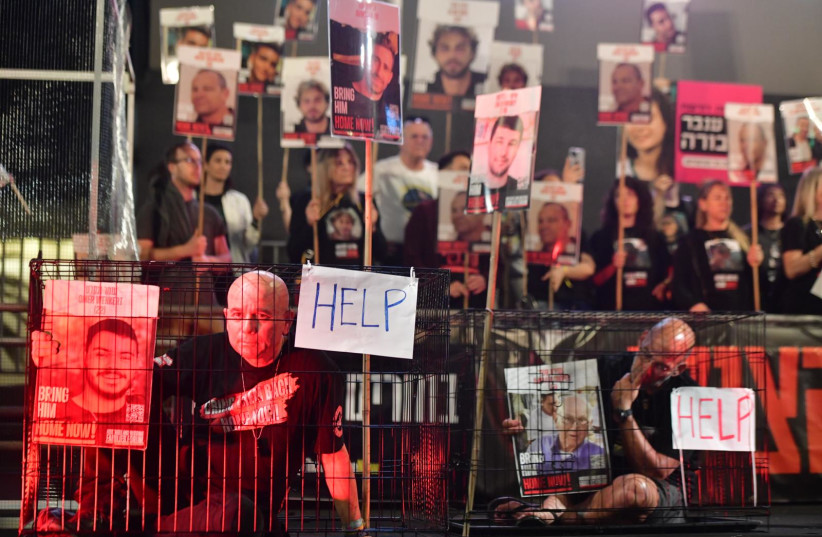Egypt plans to host a new round of hostage talks this week that will include CIA Director William Burns, amid pessimism in Israel about the possibility of an agreement as Qatar’s Ambassador to the UN in New York told relatives of hostages that a deal was still possible.
The talks, which could begin as early as Sunday, would include Qatari Foreign Minister Sheikh Mohammed bin Abdulrahman Al Thani and an Israeli delegation, Egypt’s Al Qahera News reported on Saturday.
Hamas said it would send a delegation headed by its Gaza deputy chief Khalil al-Hayya. Egyptian intelligence chief Abbas Kamel and Mossad chief David Barnea could also participate, according to media reports, although Israel has yet to make a final decision on whether to attend.
The talks come as tens of thousands demonstrated Saturday evening in dozens of locations throughout the country in protest against the government, demanding elections and a hostage-release deal.
According to the organizers, 100,000 people attended the Kaplan protest in Tel Aviv.

A rally in Jerusalem calling on leaders to secure a hostage release was set to take place on Sunday, which marks six months since the October 7 attack.
The talks come as Hamas has hardened its stance.
Hamas reiterated its demands issued in a March 14 proposal prior to a UN Security Council resolution calling for a ceasefire in the Gaza Strip that was passed on March 25.
It has insisted on a permanent ceasefire, an IDF withdrawal from Gaza, a return of displaced Palestinians, and a “serious” exchange deal of Palestinian security prisoners and terrorists for the hostages, it said.
US President Joe Biden and other American officials have appeared to blame Prime Minister Benjamin Netanyahu for the lack of success in the talks for the former.
Biden, in a phone call with Netanyahu on Thursday, urged him to “empower his negotiators to conclude a deal without delay.”
A senior Biden administration official said Biden wrote letters to Egyptian President Abdel Fattah al-Sisi and the emir of Qatar, Sheikh Tamim bin Hamad Al Thani, on the state of the hostage talks and “he urged them to secure commitments from Hamas to agree and abide by a deal.”
The official underscored Hamas’s responsibility for the lack of a deal.
Senior Biden official places blame on Hamas
“This basic fact remains true: There would be a ceasefire in Gaza today had Hamas simply agreed to release this vulnerable category of hostages – the sick, wounded, elderly, and young women,” the senior Biden official said.
“The onus is on Hamas to release the hostages and bring relief to the people of Gaza through a prolonged ceasefire,” the official said.
White House National Security Advisor Jake Sullivan will meet the families of the hostages at the White House on Monday, the official said.
The US is still hoping to see a deal that would include a six-week pause to the war in exchange for some 40 hostages.
Qatari UN Ambassador Alya Ahmed Saif Al Thani told a delegation of hostages’ family members on Friday during a meeting in New York that Hamas backed away from a deal at the end of last year after an “unexpected military action by the IDF.”
According to a release from the Hostage and Missing Families Forum, the Qatari ambassador, a close family member of the Qatari emir, described the fallout of that deal as “very distressing for everyone.”
According to Al Thani, Israel has been warned against sabotaging a current deal in the same way. Hamas has hardened its stance, according to Al Thani, though the Qatari mediator is convinced that an agreement is within reach, especially during the “critical” last days of Ramadan.
Al Thani also referred to the United States as a “very important key player” that helps exert pressure on the Israeli government.
She also encouraged the hostages’ families to keep pressuring Netanyahu.
“If we reach an agreement, it will be thanks to you, thanks to the pressure you’re applying on your government. This is the most helpful thing you can do to expedite the return of your loved ones,” she said.
While Al Thani repeatedly said Qatar is putting all its weight on Hamas, she would not provide any specific details.
Al Thani avoided answering why Qatar allows Hamas members to “live as kings.”
Al Thani said she would inquire about possibly providing a list of the hostages and their conditions.
She also promised to check the possibility of providing a list of the hostages and their conditions.
The meeting was attended by representatives of the hostages’ families: Neutra, Chen, Shtivi, Shem-Tov (Ruben), Lifshitz, Miran (Lavi), and Sharaabi.
Reuters and Jerusalem Post Staff contributed to this report.
